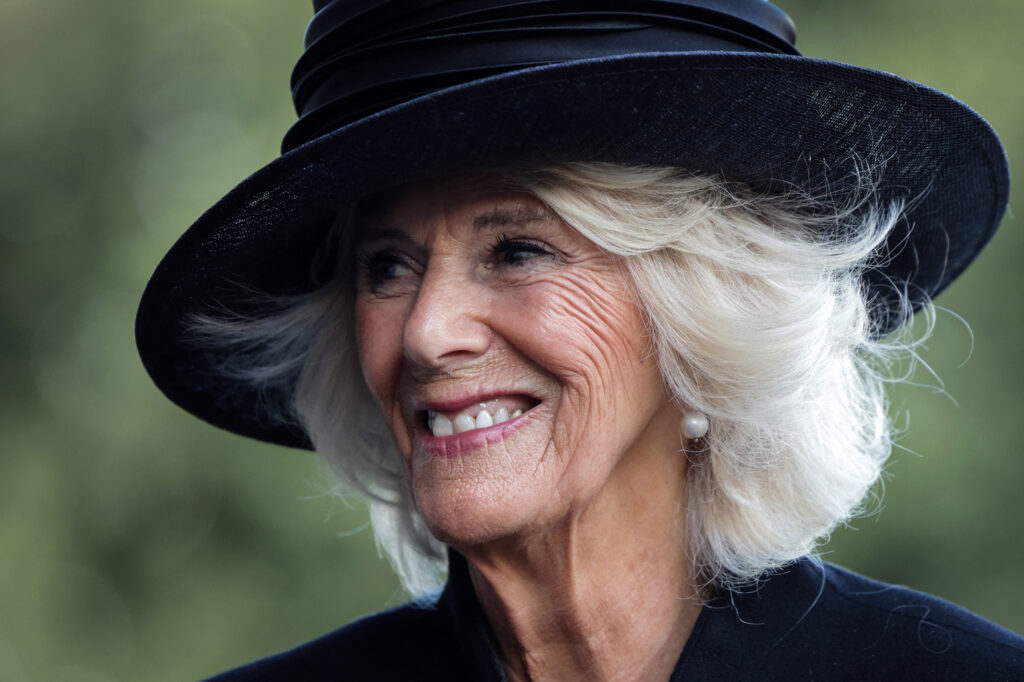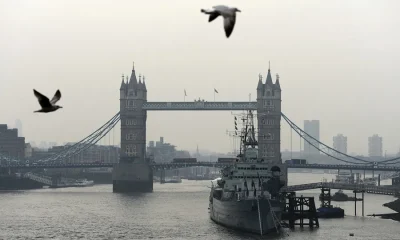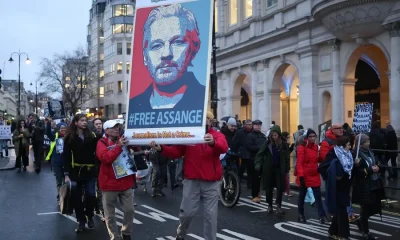International
Camilla wins praise for first week in Queen Consort role

AFP | by Juliette MONTESSE
Camilla has taken on the role of Queen Consort to her husband King Charles III with a minimum of fuss after gradually overcoming public opposition.
King Charles III, in his first speech to the nation on September 9, thanked his “darling wife” Camilla for her support.
The couple finally married in 2005 after a long-running love affair that was at times adulterous.
“I know she (Camilla) will bring to the demands of her new role the steadfast devotion to duty on which I have come to rely so much,” Charles said in a televised tribute the day after his mother’s death.
Camilla, 75, was at Charles’s side on September 8 when he rushed to the queen’s Scottish residence of Balmoral, where she died that day.
Since then, she has been travelling around the UK with the new king, showing herself to be a rock of stability in the royal family: taking part in a brief walkabout outside Buckingham Palace, the proclamation of the new king and trips to Scotland, Northern Ireland and Wales.
While Camilla is not topping polls on the most popular royals, her approval rating has hugely improved.
Last year, fewer than half of people in Britain wanted her to become queen.
A poll published by YouGov on Tuesday found 53 percent now think Camilla will do a good job as consort, while 18 percent thought she would not.
On Friday, those queueing in London to see the queen’s coffin told AFP that they respected Camilla’s support for Charles and had come to appreciate her role.
“I’ve changed my mind (about Camilla) in the last five or 10 years,” said one man, Peter Finlayson, who works in risk management.
“If you look back in history, Camilla has always been there for Charles; she is a great support to him and she has earned the right to be there.
“They are providing the continuity that we all thought we had lost with the queen.”
For Deborah Toulson, a 57-year-old maths tutor, “this week particularly, she (Camilla) has been amazing”. She said she had noticed Camilla subtly guiding Charles on what to do at recent public appearances.
Camilla has nevertheless faced long-standing dislike from many British people, who see her as morally culpable for being Charles’s mistress during his failed marriage to Diana.
She has slowly earned her stripes and won round the queen, who personally recommended that she become known as Queen Consort to Charles.
Broken toe
When Charles came to Westminster Hall last week to receive condolences from parliament, Camilla came with him in a black dress and pearls and they sat on matching gold thrones.
When the new king and his two brothers and sister held a silent vigil in Edinburgh’s St Giles’ Cathedral, standing around the queen’s coffin, Camilla sat nearby.
Tabloids welcomed the tact of the new queen, who chose to wear a diamond brooch in the shape of a thistle, Scotland’s national emblem, which had been a gift from Queen Elizabeth.
Camilla has carried out duties while recovering from a broken toe, an injury thought to have happened before the queen’s death, The Daily Telegraph reported.
“She is in quite a lot of pain but she is just getting on with it. It is unfortunate timing to say the least but she’s been an absolute trouper,” a source told the paper.
At a signing ceremony in Northern Ireland, when Charles was caught on camera losing his cool over a leaking fountain pen, Camilla stood there stoically and took the offending pen while Charles stormed out.
Camilla “has shown through time that she is an immense support for Charles and she has again proved it this week by being very calm,” said another woman waiting in the queue, Anne-Marie Whatts, a Londoner in her early 40s who works in information technology.
Camilla’s biographer Angela Levin, wrote in The Telegraph that Camilla has a better understanding than Charles of what the public is thinking because “she had a relatively normal life until her 50s”.
What remains to see is whether Camilla is allowed to express herself: over the last week, we have barely heard her speak.
Central America
Trump Administration Asks Supreme Court to Block Return of Deported Salvadoran

The Trump administration on Monday asked the U.S. Supreme Court to block a lower court order requiring the return of a Salvadoran migrant who was mistakenly sent to a maximum-security prison in El Salvador, despite having legal protection from deportation.
The U.S. government has until Monday to bring Kilmer Armado Ábrego García back to the United States, as ordered by Judge Paula Xinis in a Maryland court.
According to The Washington Post, the administration argues it lacks authority to comply because Ábrego García is currently in Salvadoran custody.
The U.S. had appealed Judge Xinis’ ruling to the Fourth Circuit Court of Appeals, but the court declined to act immediately—prompting the administration to take the case to the Supreme Court. In its filing, the government stated that “the Constitution entrusts the President, not federal district courts, with the conduct of foreign diplomacy and the protection of the nation from foreign terrorists, including through deportation.”
Ábrego García, a resident of Prince George’s County, Maryland, and married to a U.S. citizen, came under scrutiny in 2019 after an informant claimed he was a member of the MS-13 gang (Mara Salvatrucha).
Although he was initially slated for deportation, a judge later granted him a stay of removal after he requested asylum, according to the lawsuit.
Nevertheless, U.S. Immigration and Customs Enforcement (ICE) detained him on March 12, claiming his status had changed, and sent him to a detention center in Texas.
International
Teachers in Southern Mexico Bring Education to Stranded Migrant Children

Teachers in southern Mexico have created a program to provide classes for migrant children stranded in the region, following a year-over-year increase of over 70% in irregular migration among minors—many of whom lose months or even years of education during their journey toward North America.
In Tapachula, the largest Mexican city bordering Central America, three teachers offer preschool, elementary, and secondary education through the Chiapas State Migrant Education Program (Pemch).
This initiative has been replicated in key municipalities across Chiapas, including San Cristóbal de Las Casas, the capital Tuxtla Gutiérrez, Palenque, Comitán, and other border towns. Currently, there are around 1,345 migrant students and a total of 35 teachers working across farms and shelters.
Pablo Arriaga Velázquez, a teacher with the migrant education program in Tapachula, told EFE that the project was born in response to the large number of migrant minors, as enrolling them in regular schools is often difficult.
Central America
Mulino and Orsi Highlight Shared Vision After Panama Joins Mercosur as Associate State

The Presidents of Panama, José Raúl Mulino, and Uruguay, Yamandú Orsi, highlighted on Monday the path of integration both countries have undertaken in areas such as trade and the defense of democracy, following a meeting held at the Panamanian government headquarters.
In a brief statement to the press, both leaders emphasized that Panama and Uruguay share many values and are working together across different sectors. They also underlined a renewed connection following Panama’s accession last December to the Southern Common Market (Mercosur) as an Associated State.
“Panama has begun a new era of looking southward, seeking opportunities not only for work, business, and friendship, but also for regional integration in a positive sense. Today, I believe we have taken a decisive step in that direction,” said President Mulino.
The Panamanian leader stressed that his country and Uruguay “have much in common” and share “important values in terms of democracy, respect for institutions, and the rule of law—principles that must always be strengthened, no matter how much effort it takes.”
-

 Internacionales2 days ago
Internacionales2 days agoErik Prince Backs Ecuador’s Daniel Noboa in Fight Against Crime and “Narcoterrorism”
-

 Central America4 days ago
Central America4 days agoPanama’s former president Martinelli claims political enemies tried to kill him
-

 Central America2 days ago
Central America2 days agoGuatemala’s Legal Chief Shot Dead in Parking Lot: Investigation Underway
-

 International4 days ago
International4 days agoJavier Milei vows to work ‘side by side’ with the U.S. on trade rules
-

 Central America16 hours ago
Central America16 hours agoHonduras Hosts CELAC Summit Amid Regional Concern Over U.S. Deportations
-

 International16 hours ago
International16 hours agoTeachers in Southern Mexico Bring Education to Stranded Migrant Children
-

 Central America16 hours ago
Central America16 hours agoTrump Administration Asks Supreme Court to Block Return of Deported Salvadoran
-

 Central America16 hours ago
Central America16 hours agoMulino and Orsi Highlight Shared Vision After Panama Joins Mercosur as Associate State



















